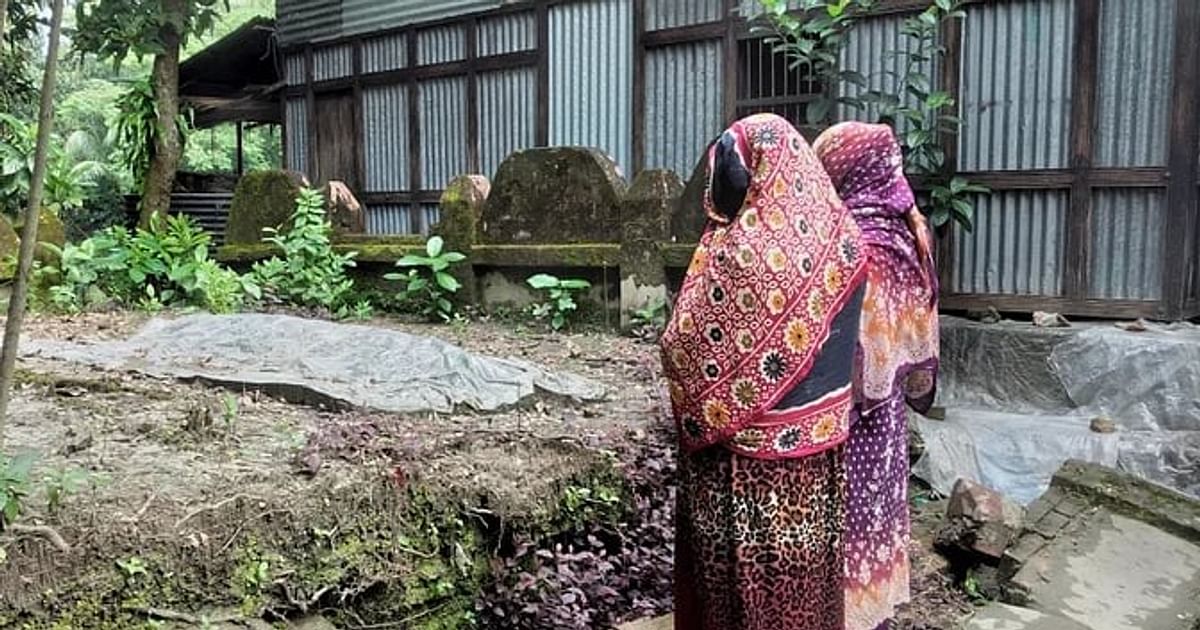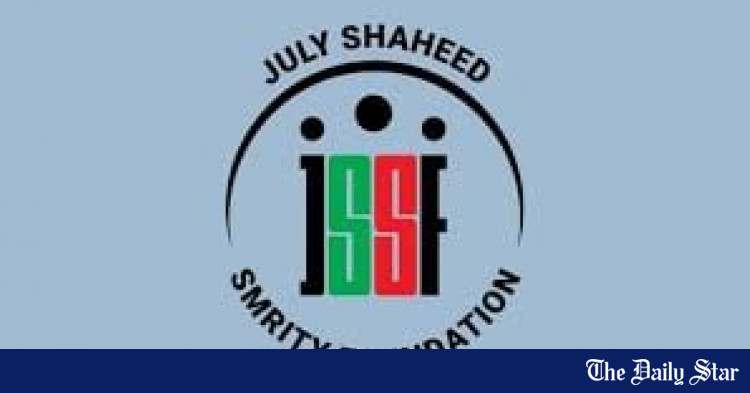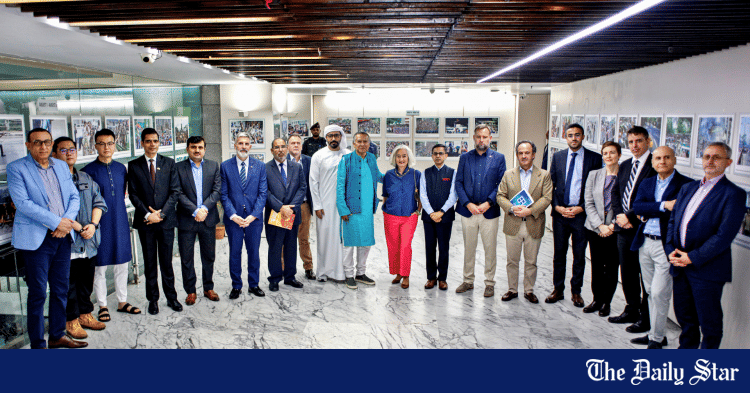- Copy to clipboard
- Thread starter
- #41
Saif
Senior Member
- Jan 24, 2024
- 12,595
- 6,968
- Origin

- Residence

- Axis Group


Who made so many people accused, asks plaintiff
But the case has been filed against some people, who are apparently not involved with the incident. Even the plaintiff does not know how so many people have been accused in the case. Now he wants to rectify the case
Who made so many people accused, asks plaintiff
Satyajit Ghosh
Shariatpur
Published: 20 Oct 2024, 21: 08

Deceased Al Amin’s mother Jiasmin Begum and sister Aflan Sinthia are crying by his grave at their village home in Dakkhin Mogor village in Naria upazila of Shariatpur on 19 October 2024 Satyajit Ghosh
Al Amin, 29, was shot to death during the movement of Students Against Discrimination (SAD) at Baipail in Savar of Dhaka on 5 August. His father, Ismail, filed a lawsuit against 154 at the metropolitan magistrate court in Dhaka on 9 October in this connection.
Several leaders of the Bangladesh Nationalist Party (BNP) from Shariatpur, Isamil’s home district, helped him in filing the case.
But the case has been filed against some people, who are apparently not involved with the incident. Even the plaintiff does not know how so many people have been accused in the case. Now he wants to rectify the case.
An expatriate to Saudi Arabia, Al Amin was the son of Ismail and Jiasmin Begum, from Dakkhin Mogor village in Naria upazila of Shariatpur. Upon returning home around four months ago, he started a grocery shop along with his father in the Baipail area. Ismail sustained bullet injuries after joining a procession to topple the government. Since then his family members did not know his whereabouts. Later on 17 August, they found his body at the morgue of Shaheed Suhrawardy Medical College Hospital and buried him at his village.
The case Al Amin’s father Ismail filed against 154 include former prime minister Sheikh Hasina, former road transport minister Obaidul Quader, former home minister Asaduzzaman Khan Kamal, former deputy minister Enamul Haque Shamim, former MP Bahauddin Nasim, BM Mozammel Haque, Opu Ukil and so on.
Besides, the accused include former mayor and councillor of various pourashavas of Shariatpur, upazila parishad chairman and union parishad chairman and local Awami League leaders.
The accused list include US expatriate Abdus Salam, Shariatpur press club general secretary freedom fighter Abdus Samad Talukder, ailing physician Alamgir Mati, National Institute of CardioVascular Diseases (NICVD) physician Ashraful Haque and Naria upazila assistant cooperative officer Shahadat Hossain.
At least 15 of the accused are traders.
Following the filing of the case, judge Dilruba Afroze of the metropolitan magistrate court in Dhaka ordered the Kafrul police station to inform the court by 21 October whether any general diary (GD), unnatural death (UD) case or any regular case was filed in connection with the death of Al Amin and whether the police are investigating the case.
Plaintiff Ismail claimed Naria upazila unit BNP president Dadan Munshi and a convict in a murder case, Babul Talukder, are behind the case.
Babul Talukder, who has been awarded life term imprisonment in a case filed over the murder of former public prosecutor of Shariatpur judge court Habibur Rahman and his brother Monir Hossain Munshi, is currently on the run.
In the case filed over the death of Al Amin, Habibur Rahman’s son Parvez Rahman and Mezbaur Rahman and Monir Hossain’s son Borhan Munshi have been accused.
Besides them, several accused who were acquitted from the case filed over the murder of two brothers from Shariatpur have also been accused.
Speaking to Prothom Alo, plaintiff Ismail said, “Several BNP leaders and a convict accused in a murder case in Shariatpur town communicated with me regarding the case. They called me with a proposal to help me. They said one thing and did the opposite. I did not realise they would use me to file cases against various people. My sign was taken through the lawyer to file the lawsuit. Now I’m caught in a cleft stick for that signature. I’m trying to rectify the case through legal ways.”
US expatriate Abdus Salam has been made accused in the case. He told Prothom Alo over phone, “I’ve come to the US in June. I was not even in the country when the incident took place. I have been made accused due to enmity. Now those people are asking money from my relatives to drop my name as an accused.”
Another accused, Shariatpur press club general secretary freedom fighter Abdus Samad Talukder told Prothom Alo, “A certain group attacked my house after the fall of the government. Those people have made me an accused in the case.”
Modern Herbal’s founding physician Alamgir Mati has been ailing for a long time and remains bedridden often.
His personal assistant told Prothom Alo, “Our sir is sick. He needs help from others even for walking. We are astonished that such a person has been made murder accused.”
Prothom Alo could not contact Babul Talukder as he has been hiding.
Naria upazila BNP president Dadan Munshi is currently in Saudi Arabia to perform Umrah Hajj.
Speaking to Prothom Alo over WhatsApp Sunday morning, he said, “Al Amin’s father phoned me seeking help to file a case. Since then I haven’t communicated with him.”
He claimed that he did not know who have been made accused in the case.
Visiting deceased Al Amin’s village home on Saturday morning, his mother Jiasmin Begum and sister Aflan Sinthia were found to be crying by his grave.
Jiasmin Begum lives with a son and a daughter in a house made of iron sheets. She told this correspondent she has been lamenting the loss of her son for the last two and a half months. Amid this she has been facing the tangles of the case.
She further said they do not want to run the case that way.
* The report has been rewritten in English by Shameem Reza
Satyajit Ghosh
Shariatpur
Published: 20 Oct 2024, 21: 08
Deceased Al Amin’s mother Jiasmin Begum and sister Aflan Sinthia are crying by his grave at their village home in Dakkhin Mogor village in Naria upazila of Shariatpur on 19 October 2024 Satyajit Ghosh
Al Amin, 29, was shot to death during the movement of Students Against Discrimination (SAD) at Baipail in Savar of Dhaka on 5 August. His father, Ismail, filed a lawsuit against 154 at the metropolitan magistrate court in Dhaka on 9 October in this connection.
Several leaders of the Bangladesh Nationalist Party (BNP) from Shariatpur, Isamil’s home district, helped him in filing the case.
But the case has been filed against some people, who are apparently not involved with the incident. Even the plaintiff does not know how so many people have been accused in the case. Now he wants to rectify the case.
An expatriate to Saudi Arabia, Al Amin was the son of Ismail and Jiasmin Begum, from Dakkhin Mogor village in Naria upazila of Shariatpur. Upon returning home around four months ago, he started a grocery shop along with his father in the Baipail area. Ismail sustained bullet injuries after joining a procession to topple the government. Since then his family members did not know his whereabouts. Later on 17 August, they found his body at the morgue of Shaheed Suhrawardy Medical College Hospital and buried him at his village.
The case Al Amin’s father Ismail filed against 154 include former prime minister Sheikh Hasina, former road transport minister Obaidul Quader, former home minister Asaduzzaman Khan Kamal, former deputy minister Enamul Haque Shamim, former MP Bahauddin Nasim, BM Mozammel Haque, Opu Ukil and so on.
Besides, the accused include former mayor and councillor of various pourashavas of Shariatpur, upazila parishad chairman and union parishad chairman and local Awami League leaders.
The accused list include US expatriate Abdus Salam, Shariatpur press club general secretary freedom fighter Abdus Samad Talukder, ailing physician Alamgir Mati, National Institute of CardioVascular Diseases (NICVD) physician Ashraful Haque and Naria upazila assistant cooperative officer Shahadat Hossain.
At least 15 of the accused are traders.
Following the filing of the case, judge Dilruba Afroze of the metropolitan magistrate court in Dhaka ordered the Kafrul police station to inform the court by 21 October whether any general diary (GD), unnatural death (UD) case or any regular case was filed in connection with the death of Al Amin and whether the police are investigating the case.
Plaintiff Ismail claimed Naria upazila unit BNP president Dadan Munshi and a convict in a murder case, Babul Talukder, are behind the case.
Babul Talukder, who has been awarded life term imprisonment in a case filed over the murder of former public prosecutor of Shariatpur judge court Habibur Rahman and his brother Monir Hossain Munshi, is currently on the run.
In the case filed over the death of Al Amin, Habibur Rahman’s son Parvez Rahman and Mezbaur Rahman and Monir Hossain’s son Borhan Munshi have been accused.
Besides them, several accused who were acquitted from the case filed over the murder of two brothers from Shariatpur have also been accused.
Speaking to Prothom Alo, plaintiff Ismail said, “Several BNP leaders and a convict accused in a murder case in Shariatpur town communicated with me regarding the case. They called me with a proposal to help me. They said one thing and did the opposite. I did not realise they would use me to file cases against various people. My sign was taken through the lawyer to file the lawsuit. Now I’m caught in a cleft stick for that signature. I’m trying to rectify the case through legal ways.”
US expatriate Abdus Salam has been made accused in the case. He told Prothom Alo over phone, “I’ve come to the US in June. I was not even in the country when the incident took place. I have been made accused due to enmity. Now those people are asking money from my relatives to drop my name as an accused.”
Another accused, Shariatpur press club general secretary freedom fighter Abdus Samad Talukder told Prothom Alo, “A certain group attacked my house after the fall of the government. Those people have made me an accused in the case.”
Modern Herbal’s founding physician Alamgir Mati has been ailing for a long time and remains bedridden often.
His personal assistant told Prothom Alo, “Our sir is sick. He needs help from others even for walking. We are astonished that such a person has been made murder accused.”
Prothom Alo could not contact Babul Talukder as he has been hiding.
Naria upazila BNP president Dadan Munshi is currently in Saudi Arabia to perform Umrah Hajj.
Speaking to Prothom Alo over WhatsApp Sunday morning, he said, “Al Amin’s father phoned me seeking help to file a case. Since then I haven’t communicated with him.”
He claimed that he did not know who have been made accused in the case.
Visiting deceased Al Amin’s village home on Saturday morning, his mother Jiasmin Begum and sister Aflan Sinthia were found to be crying by his grave.
Jiasmin Begum lives with a son and a daughter in a house made of iron sheets. She told this correspondent she has been lamenting the loss of her son for the last two and a half months. Amid this she has been facing the tangles of the case.
She further said they do not want to run the case that way.
* The report has been rewritten in English by Shameem Reza











